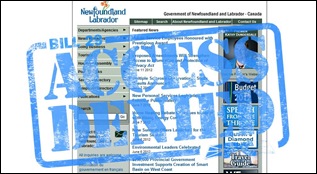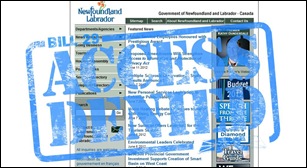The Telegram editorial last Thursday (December 8), complained about the practice some government departments use of releasing access to information requests from one media outlet to all outlets.
The trigger for the editorial was a decision by Nalcor Energy to release salary details on it senior executives to all the local news media even though the initial request came from just one media outlet.
Part of the problem for media outlets is that – as the Telly notes – “access to information journalism is neither easy nor cheap. Requests take months to come to fruition and can cost hundreds (and sometimes thousands) of dollars.”
When the agency releases the information to everyone free of charge, the media outlet winds up taking a gigantic financial hit in addition to just getting scooped on a story.
It’s all true.
To be frank, one of the reasons a government department or agency would release information like that is to take control of the story away from the particular news room. By releasing the information generally, the department or agency can ensure its version of events, its side of the story, gets out there without the particular filter applied by the news room that originally pursued the story.
It’s not “petty revenge” as the editorial describes the practice. It’s called protecting your interests and your reputation. In dealing with some “news” organizations, it would be called common sense.
There’s no news in reporting that government departments handle media and opposition party access to information requests differently from those from ordinary mortals. There are even academic studies that show just exactly how some federal departments have done exactly that and the reasons behind it.
The Telly editorial writer finishes off with a worthwhile suggestion:
if releasing specific access claims is really an example of accountability, release them all, including information requested by private citizens, businesses, unions and law firms.
The Department of National Defence has been doing something like that for the last decade and then some. The current DND web page on access to information requests goes back to 2006, but your humble e-scribbler has been using it, on and off, for a decade or more.
A chart of the web page lists the request number a description of the request and the outcome. You can find released information by year and month. All you’d have to do in order to receive the same information is contact the department and pay the costs of copying and mailing, just as you would have done if you’d asked for the information yourself.
Scan the list and you can see information requests that came from one newsroom or another. You’ll see requests from private individuals, researchers and, in some instances, from companies providing temporary employees or other contract service to the department.
If you want to get a sense of the scope of the access to information challenge in a department like National Defence, you can check out a 2000 article by then Lieutenant Colonel Brett Boudreau in the Canadian Military Journal. Boudreau notes that the number of access requests went from 67 in 1983-84 to more than 1,000 by 1998-1999.
But within that number, one of the recent reports Boudreau mentions was a 35,000 page report that took six months to review and “sever” for information that had to be withheld under access laws.
Automatically releasing - that is distributing - all access requests would be practically very difficult, even in an age of scanners, pdfs and the Internet.
But providing a list of access requests that are available?
That’s certainly possible. More federal departments would probably consider it as a practical approach to the administrative demands of access to administration.
That’s the federal government, though, where access to information is a well-established system.
In Newfoundland and Labrador, they’d have to accept the idea of public access to information in the first place.
- srbp -


